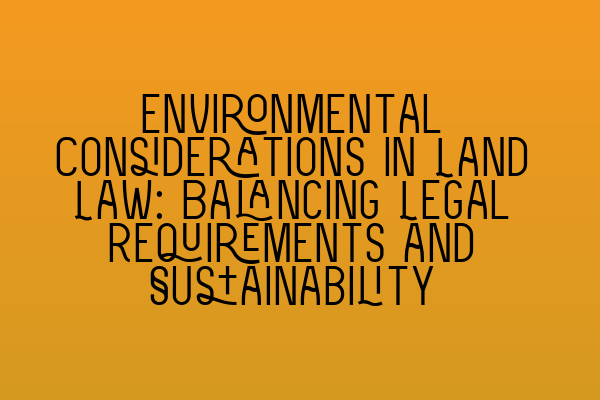Environmental Considerations in Land Law: Balancing Legal Requirements and Sustainability
Introduction
As the world becomes increasingly aware of the environmental challenges we face, it is important for all sectors, including property and land law, to consider the impact of their actions on the environment. Balancing legal requirements with sustainability is crucial in ensuring a harmonious relationship between human activities and the natural world. In this blog post, we will explore the environmental considerations in land law and discuss how legal professionals can navigate these issues effectively.
Legal Requirements and Sustainable Development
Land law encompasses various aspects, including property ownership, land use, and development. When it comes to environmental considerations, legal professionals need to be well-versed in the laws and regulations that govern sustainable land use. These may include land use planning, conservation, environmental impact assessments, and pollution control.
One key legal requirement in land law is the need to obtain planning permission before undertaking any development on a piece of land. This is to ensure that the proposed development complies with local planning policies, which often incorporate environmental considerations. Sustainable development principles are increasingly being incorporated into planning policies, emphasizing the importance of minimizing environmental impacts and promoting long-term sustainability.
Environmental Impact Assessments (EIA) play a critical role in ensuring that proposed developments take into account the potential environmental effects. EIAs are comprehensive studies that assess the potential impacts of a project on the environment, including considerations of biodiversity, air and water quality, noise pollution, and carbon emissions. Legal professionals involved in land law must understand the EIA process and advise clients accordingly to mitigate any significant adverse effects on the environment.
Conservation and Biodiversity
Protecting and conserving biodiversity is another important consideration in land law. Biodiversity refers to the variety of plant and animal species that exist in a particular habitat. It is essential for the functioning of ecosystems and provides various ecological, economic, and cultural benefits. Legal professionals involved in land law should be knowledgeable about legislation such as the Wildlife and Countryside Act, which offers protection to wildlife and important habitats.
Environmental sustainability also involves promoting practices that enhance biodiversity. This may include incorporating green spaces, such as wildlife corridors and green roofs, into development plans. These green spaces can provide habitat for wildlife, improve air quality, and mitigate the effects of climate change. Legal professionals can advise clients on how to incorporate biodiversity-enhancing measures into their land use plans and promote sustainable practices.
Climate Change and Energy Efficiency
In recent years, climate change has become a pressing global issue. As legal professionals in land law, it is essential to consider the impact of climate change and promote energy-efficient practices in development projects. This includes complying with building regulations that aim to reduce carbon emissions and increase energy efficiency in buildings.
Additionally, legal professionals can advise clients on renewable energy options, such as installing solar panels or using geothermal systems, to reduce reliance on fossil fuels. Encouraging sustainable energy practices not only helps combat climate change but also offers long-term cost savings for property owners.
Conclusion
Environmental considerations in land law are crucial in ensuring sustainable development and protecting the natural environment. Legal professionals must navigate the complex landscape of legal requirements and balance them with sustainability goals. By incorporating environmental impact assessments, promoting biodiversity conservation, and considering energy efficiency, legal professionals can play a vital role in creating a more sustainable future.
At SQE Property Law & Land Law, we understand the importance of environmental considerations in land law. Our team of expert solicitors specializes in guiding clients through the legal complexities while ensuring sustainable practices. Contact us today to find out more about our services and how we can assist you.
Related Articles:
– SQE 1 Practice Exam Questions
– SQE 1 Practice Mocks FLK1 FLK2
– SQE 2 Preparation Courses
– SQE 1 Preparation Courses
– SRA SQE Exam Dates
